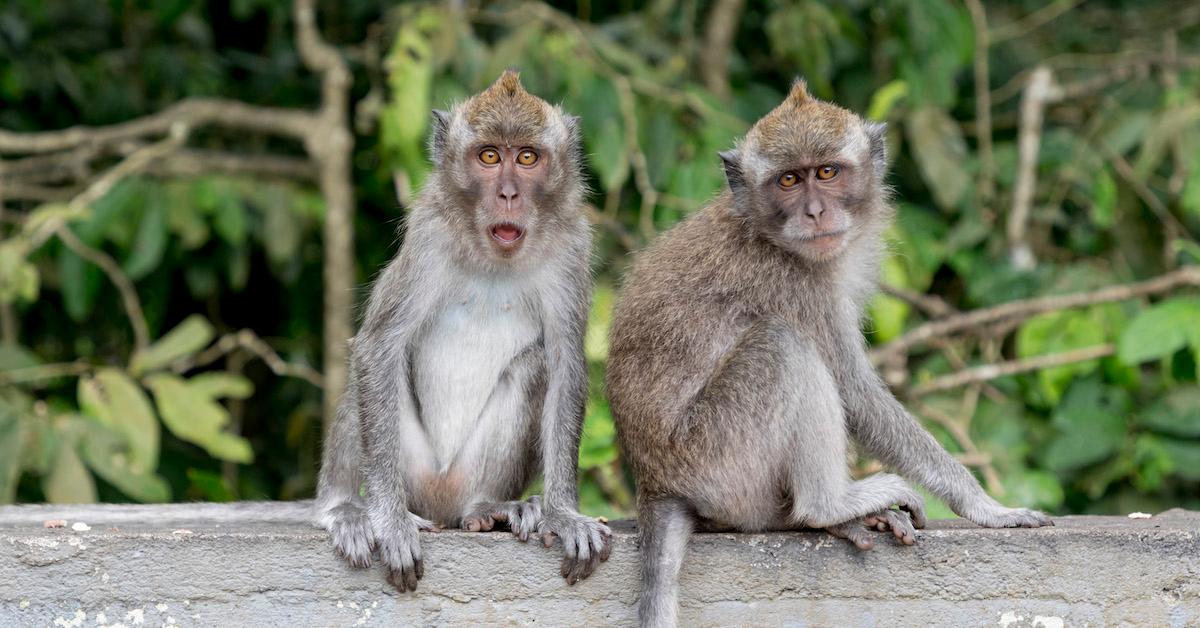The Climate Crisis Will Wipe Out Wildlife More Abruptly Than We Think, New Study Finds
Various species may go extinct sooner than previously thought.
Updated April 29 2020, 4:52 p.m. ET

Two long tailed Balinese Macaque at Padangtegal Great Temple of Death in Bali, Indonesia on August 13, 2019.
With all the talk of people trying to live more sustainably and lower greenhouse gas emissions, you’d think that we were at least headed towards mitigating the climate crisis, right? Well, according to a new study, the ways humans are treating the planet are on track to hurt wildlife much worse than previously thought — but not all hope is lost. As the study found, if we do not maintain the temperature goals of the Paris Agreement, a “potentially catastrophic loss of global biodiversity is on the horizon.”
The study, recently published in the journal Nature, looked at annual weather rates and projections from 1850 to 2100, across more than 30,000 animal species. The researchers used this data to estimate when these various species would be exposed to “potentially dangerous climate conditions” (generally, temperatures that their species would not be able to withstand) that could cause an “abrupt exposure event,” which is a wipeout of at least 20 percent of each species (or worse, go extinct).
“We project that future disruption of ecological assemblages as a result of climate change will be abrupt, because within any given ecological assemblage the exposure of most species to climate conditions beyond their realized niche limits occurs almost simultaneously,” the authors wrote.
Basically, in looking at the data, they found that the rapidly changing climate will cause species (or “ecological assemblages,” which are taxonomically related groups of species) to go extinct suddenly as opposed to gradually. This means there won’t be time to save them.
If humans continue burning fossil fuels and emitting greenhouse gases at the current rate, these abrupt changes could occur in tropical oceans by 2030, and on land — primarily in extreme weather areas such as tropical forests and higher latitude regions (like the North Pole and South Pole) — by 2050.
However, we can save many species from suddenly taking a hit by ramping up efforts to slow the climate crisis and meet the central goal of the UN’s Paris Agreement: Keep the global temperature rise this century well below 2 degrees Celsius above pre-industrial levels, but ideally below 1.5 degrees Celsius above pre-industrial levels. To do this, we humans need to severely reduce our impact on the planet by reducing our reliance on fossil fuels, animal agriculture, and more.
If we achieve the two-degree goal, the study’s authors project that less than 2 percent of ecological assemblages will experience abrupt exposure events. But if global heating continues to get worse, more and more animal species will experience these events and possibly go extinct.
However, even if we are able to achieve the Paris Agreement’s goal, and in turn only affect 2 percent of the species in question, there’s one species we aren’t considering: Homo sapiens.
“If we take action now, we limit this abrupt disruption to 2 percent of the planet,” co-author Dr. Christopher H. Trisos, a University of Cape Town scientist, told The New York Times. “But that 2 percent of the planet still has a lot of people living there in tropical regions. And they need our help.”
The climate crisis affects us all more than we think. And as Trisos mentions, people living in tropical areas are at the highest risk of climate devastation — even though they are likely responsible for far less emissions than people in many other parts of the world.